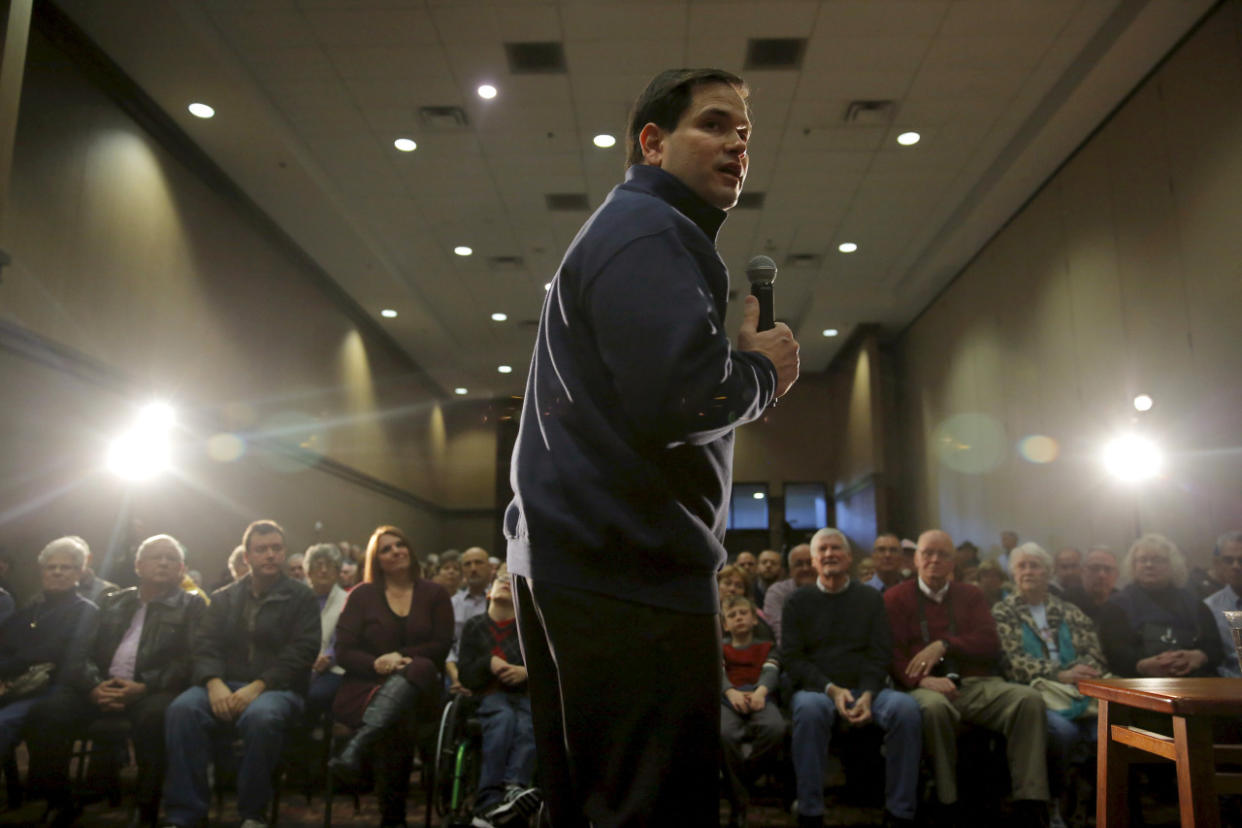Rubio shifts to woo Cruz evangelicals

U.S. Republican presidential candidate Marco Rubio speaks at the Pzazz! Convention and Events Center in Burlington, Iowa, Jan. 29, 2016. (Photo: Aaron P. Bernstein/Reuters)
A presidential candidate’s closing statement at the end of a debate is a set piece.
It’s a moment for a candidate to leave the audience with one final thought, an impression to walk away with. And so each candidate puts some thought into what they will say before the stage goes dark.
Ben Carson, for example, recited from memory the preamble to the U.S. Constitution, the nation’s founding document, on Thursday night at the seventh Republican debate in Des Moines, Iowa.
Then it was Marco Rubio’s turn, and the U.S. senator from Florida launched quickly into what sounded like a prepared statement.
“The Bible commands us to let our light shine on the world,” Rubio said without hesitation.
His comment was a reference to Jesus’ Sermon on the Mount, in the book of Matthew, chapter five. Jesus tells his followers, “Let your light shine before others, that they may see your good deeds and glorify your father in heaven.”
The lesson is a spiritual one. Jesus is saying that his followers — across all nations and ethnic groups — “are the light of the world,” but only if they allow grace to transform their own lives and to impact others. The desired outcome, Jesus says, is that those who don’t know God will worship him.
In Rubio’s interpretation of the text on the debate stage, however, America’s democratic system of government and its promotion of freedom is the “light,” and the goal of following Jesus’ command to “let your light shine” is to make the world a more free and prosperous place.
Slideshow: On the trail and down to the wire in Iowa >>>
“For over 200 years, America’s light has been shining on the world, and the world has never been the same again. But now, that light is dimming a little, after seven years of Barack Obama. And that’s why Monday night, what will happen here in Iowa is so important,” Rubio said, referring to the caucuses that are the first presidential primary contest.
“When I’m president,” Rubio said, using a phrase that he repeated eight times during the two-hour debate, “America’s light will shine again and the 21st century will be a new American century.”
Rubio’s comments were noteworthy because they represented a shift from the way he generally talks about religion.
The 44-year-old lawmaker has more in common with younger evangelicals who are less comfortable conflating church and country. But the majority of evangelical likely caucus-goers in Iowa are older and more likely to welcome Rubio’s rhetoric about “America’s light.”
Rubio referred to the light that Jesus described as a spiritual reality in an individual as something a nation can possess. That could be taken to mean that if Rubio is president he would seek to usher in a revival of Christian devotion in America.
Obama has dimmed the “light” in America, Rubio said, and promised to make it shine again.
Rubio’s director of faith outreach, Eric Teetsel, earlier this month criticized Sen. Ted Cruz, R-Texas, for comparing his own campaign to a religious revival.
“I have heard advocates for other candidates say, ‘America is in need of revival, and my candidate is the one who can bring it,’” Teetsel told me. “And I say, ‘No. That is not where revival comes from.’”
This is a distinctive element of the rising younger generation of evangelicals, who model their faith much more after New York city pastor Tim Keller than the late Jerry Falwell, founder of Liberty University, whose son Jerry Falwell Jr. this week endorsed businessman Donald Trump.
Spiritual and moral renewal, the Keller wing of evangelicalism believes, comes from preaching the gospel of Jesus, the good news of his life, atoning death, and resurrection. These evangelicals are adamant that to the degree Christians mix gospel language with political purposes or parties, they dilute the power of the message.
Rubio has talked a lot about his own faith in recent days on the stump in Iowa, where 60 percent of caucus-goers identify as evangelical. That’s not what younger evangelicals of the Keller wing have a problem with at all. And they’d also agree with Rubio’s statement in the debate Thursday that America at its founding was deeply influenced by Christianity.
“If you do not understand that our Judeo-Christian values are one of the reasons why America is such a special country, you don’t understand our history,” Rubio said.
However, Rubio’s conflation of Jesus’ command in the Sermon on the Mount with America’s prosperity as a nation does seemingly run counter to the way that younger evangelicals think about their faith. America is not the kingdom of God in their minds, as it sometimes seems to be in the conception of older evangelicals, who grew up in a country that largely abided by the cultural norms of their faith.
Yet Rubio needs to win over evangelicals in Iowa, and they are largely not of the Keller variety. And as Monday’s caucuses draw near, he’s stretching himself a bit to try to win over the more traditional faith voters who have been courted all year by Cruz.


